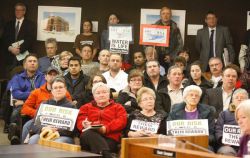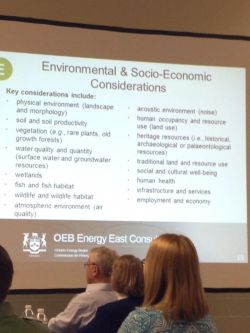Halifax Media Co-op
News from Nova Scotia's Grassroots
Canada Needs A Climate and Energy Policy Before We Allow More Pipelines

Opponents of the Energy East pipeline proposal packed North Bay council chambers in this file photo. Council has approved a motion to allow Mayor Al McDonald to seek intervenor status at National Energy Board hearings into the proposed pipeline. (Nugget.ca April 6, 2014)

Council chambers were packed beyond capacity on Tuesday evening, filled with local residents who were eager to voice their concerns regarding the Energy East Pipeline Project, set to run through North Bay. (baytoday.ca Feb. 19, 2014)
On April 2, 2014, Gerry LaBelle and Cathy Orlando from the non-profit organization, “Citizens Climate Lobby Canada”, presented at the Ontario Energy Board (OEB) consultations for Energy East, a pipeline that will carry diluted bitumen (a.k.a., dilbit, tarsand and oil sands) from Alberta to New Brunswick.
One thing they noticed about the OEB was that its key considerations did not include climate change. As they noted, “Climate and energy are as intertwined as diabetes and sugar." As a result of this omission, their submission emphasized that citizens (of the city on behalf of which the submission was made—North Bay) do contextualize the climate issue with their chief concern: the threat posed to their water source—Trout Lake—from oils spills and compromises posed by building the Energy East pipeline. They presented statistics that underlie the essential need to make the climate change situation a seminal factor to consider in developing a much-needed national energy policy.
“Environment Canada’s own numbers show that we are on track to blow past our 2020 emission target by 20%, releasing 734 megatonnes of carbon pollution in 2020 compared to our 737 CO2 emissions in 2005. And by 2030 emissions will have grown to 815 Mt CO2. Much of the increase will be from the oil sands.”
They outlined that Canada is sorely out of step with the world with regard to having policies in place that represent an understanding of the link between climate change and energy directives. They noted:
“A Globe International study in March 2014 revealed that 62 of 66 Nations studied have either passed or are pushing for compelling and energy-relevant laws. Canada is not one of them. In the Germanwatch’s Climate Change Performance Index 2014 from their website, it was revealed that, of the assessed countries for climate and energy policies, Canada ranked at the very bottom of the G-20 pack and, worldwide, only Iran, Kazakhstan and Saudi Arabia rank below Canada.”
Below are three implications of Canada’s lack of climate and energy policy they submitted to the OEB Energy East Consultation (from a total of five):
National security – A New Strategic Narrative for the USA was presented to the Joint Chiefs of Staff in 2011. One of its main conclusions was that ‘national security issue is best addressed by going from containing problems worldwide to creating sustainable economies.’ The report clearly highlights that climate change must be addressed to achieve global and national security.
Stranded assets and financial collapse – If more than 23% of the known fossil fuel reserves are burned, the climate issue will become dire. This “carbon bubble,” caused by the intensifying of climate change, means that a real risk for stranded assets and financial collapse exists. The Organization for Economic Cooperation and Development is quite clear, “Unlike the financial crisis, we do not have a 'climate bailout option' up our sleeves.”
In March 2014, oil companies are sounding the alarm. BP is calling for a price on carbon to avoid the worst impacts of climate change. Shell and Exxon are warning their shareholders about the coming carbon bubble. Andrew Logan, director of the oil and gas program at Ceres said in a Globe and Mail article, “Of all the assets an oil company can own, the oil sands raises the most concern.” This is not new news. A 2010 MIT report clearly stated that under carbon caps worldwide, Canada’s bitumen industry becomes economically non-viable through to the 2050 horizon even with carbon capture and sequestration
Missing out on the clean tech revolution – In a 2009 report in “Scientific American,authors Mark Jacobson and Mark Delucci found that we can meet the entire world's energy needs with renewables in twenty years; do it without nuclear and for the same money that we’d be spending on fossil fuel power. A February 2014 study by the International Energy Agency found that any country can reach high shares of wind and solar power cost effectively.
The IPCC report clearly states we must cut emissions. Doing so is a must if Canada is to save its reputation as a responsible global citizen and help create a more liveable future. The crucial codicil to that irrefutable statement of “will” that our country is missing is that we can and must create clean energy jobs as a by-product of that realized undertaking.
A study released by "Analytcal Advisors" (http://analytica-advisors.com/sites/default/files/CCTIR_2013%20Prospectu...) in March 2014 found that between 2008 (when British Columbia legislated a revenue neutral carbon tax) and 2010, the province’s clean technology sector grew by 48 per cent; their GHG emissions dropped and their GDP grew above the national average.
Orlando and LaBelle summed up their presentation with the raison d’être behind Citizens Climate Lobby. “All that is lacking is political will for a low carbon future.” They concluded with: “Even though the OEB does not consider climate as a key consideration, at Citizens Climate Lobby, we generate lots of political heat for its inclusion in the seminal discussions igniting all over Canada involving pipelines. We are happy to announce at the end of the presentation four people approached us to start a Citizens Climate Lobby chapter in North Bay.”
For more about Citizens Climate Lobby explore our Canadian CCL Website; “Like” us on Facebook; see these articles in The New York Times and The Guardian and watch this short film: bit.ly/cclfilm.
The site for the Halifax local of The Media Co-op has been archived and will no longer be updated. Please visit the main Media Co-op website to learn more about the organization.




